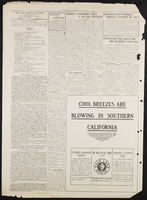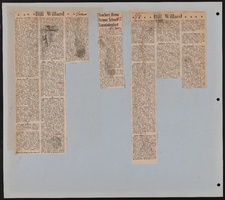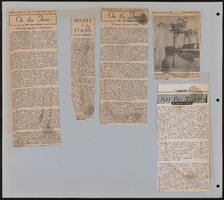Search the Special Collections and Archives Portal
Search Results
Ronzone, Richard James, 1917-1989
Richard “Dick” J. Ronzone (1917-1989) was active in the local politics and civic affairs of Las Vegas, Nevada, serving as a Clark County Commissioner, a Nevada State Assemblyman, and a member of the University Board of Regents. He inherited and managed his family's retail store which dated back to the early 1900s. Ronzone also helped develop the Municipal Golf Course and was active in the Elks Lodge, Rotary Club, Veterans Of Foreign Wars, Reserve Officers Association, and the Boulder Dam Area Council of the Boy Scouts of America.
Person
Hank Henry Papers
Identifier
Abstract
The Hank Henry Papers consist of materials on the entertainment career of Hank Henry from 1934 to 1980. The collection contains skits and jokes, family photographs, photographs of burlesque shows, photographs and autographs of various actors and actresses, newsletters, newspaper articles and correspondence.
Archival Collection
George Ladd Papers
Identifier
Abstract
The George Ladd Papers are comprised of a scrapbook dating from 1903 to 1906 that documents the final years of George Ladd, who was involved with the Bullfrog Mine in Rhyolite, Nevada. The scrapbook contents include personal correspondence, certificates of assays, telegrams, mining purchases, bank deposit slips, and correspondence between Ladd and the Bullfrog Mining Company.
Archival Collection
Stonewall Park Collection
Identifier
Abstract
The Stonewall Park Collection (1983-1987) documents the Stonewall Park project, an unrealized gay community in Nevada. Material includes news clippings and ephemera, as well as financial records and ancillary documents detailing bankruptcies and litigation associated with the Stonewall Park project. Much of this material is photocopied from MS 1990-15 (Fred Schoonmaker Papers), held at the Museum of GLBT History in San Francisco, CA.
Archival Collection

Transcript of interview with Eldon Cunningham by Randall L. Williams, March 14, 1981
Date
Description
On March 14, 1981, Randall Williams interviewed Eldon Cunningham (born 1920 in Granby, Missouri) about his life in Las Vegas, Nevada. Cunningham first talks about his family background, his reason for moving to Las Vegas, and his service in the military during World War II. He also mentions the Twin Lakes area of Las Vegas, his hobby of prospecting, and his work with Clark County Electric as an electrician. Cunningham also talks in detail about some of his experiences while working at the Nevada Test Site in electrical work. As the interview concludes, Cunningham talks more about family illnesses, experiments at the Test Site, and his former hunting practices.
Text

Transcript of a narrative by Lucile Bunker, March 10, 1977
Date
Archival Collection
Description
Text




